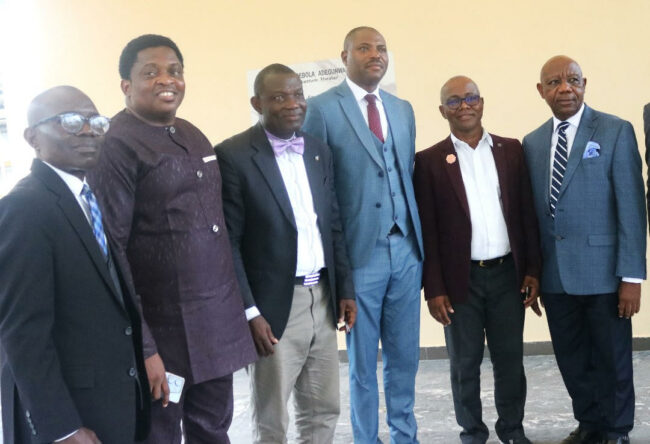Nigeria can attain sustainable development through the instrumentality of indigenous knowledge and constitution.
This was the consensus of speakers at the first ‘International Conference on Law and Society’ organised by the Faculties of Law and Social Sciences of the Olabisi Onabanjo University (OOU), Ago Iwoye, which was between July 1 and July 4, 2024.
The keynote speakers at the conference, Professor Olatunji Ogunyemi of the University of Lincoln, United Kingdom, and Professor Babatunde Oni, SAN, of the Lagos State University (LASU), were unanimous on the adoption of an indigenous approach to Nigeria’s development.
The dons averred that Nigeria needs to domesticate the provisions of the Sustainable Development Goals (SDGs) for effective implementation.
“We are supposed to own our constitution to decide the way we want to develop,” Professor Oni said. According to Professor Ogunyemi, “there is the need to bring indigenous languages into our classrooms to accelerate our national development.”
The scholars advanced the protection of the rule of law by an independent judiciary and an environment of a fair and equitable legal system as some of the ingredients of sustainable development.
They added that to achieve this, there is the need for active engagement of members of the society in governance, separation of powers and accountability, independence of the Independent National Electoral Commission (INEC), as well as total independence of the judicial arm of government without infiltration by either the executive or the legislature.
Professor Oni, who was the first keynote speaker, noted that good governance is pivotal for sustainable development in any country.
Speaking on the topic ‘Law, Good Governance and Sustainable Development’, the don said the growth and development of a country start from good leadership.
“Good governance starts from a recognition that the nation, institution or enterprise is operated for the benefit of everyone with an obligation of accountability,” he stated.
He added that leaders are entrusted with the authority to manage to deliver benefits to the people but the people must have the courage, humility, and self-control to put in place checks on the authority.
According to him, the functions of law are to cultivate and ensure the existence of order, provide resolutions to conflicts, provide a safe haven for individuals and their assets, among others.
The Professor of Law listed lack of accountability, transparency, and trust, lack of independence of the electoral commission, favouritism and nepotism, insecurity, and corruption as some of the ills associated with bad governance.
To ensure good governance for sustainable development, Oni stated that active engagement of members of the society in governance, separation of powers and accountability, independence of INEC, and judicial autonomy should be prioritised.
“Laws should be established based on the consent and participation of the people. Since the majority of our laws were adopted from the colonialists, Nigerians do not feel connected to some of these laws. However, this can be rectified by the government in ensuring active participation of the people in the lawmaking process.
“Also, to ensure good governance, the doctrine of separation of powers and accountability is highly important. The purpose of separation of powers is to prevent the concentration of power and provide for checks and balances.
“The primary requirement for ensuring citizens’ demand for accountability in Nigeria under a democratic rule is the sanctity of the citizens’ votes.
“The legislature should also consider making amendments to the constitution that makes the disregard of the separation of powers an impeachable offense,” he added.
In his keynote address, Ogunyemi, a professor of journalism at the School of Film, Media and Journalism, University of Lincoln, United Kingdom, implored arts, social sciences, and humanities to prioritise the inclusion of the SDGs in their curricula.
Speaking on ‘Integrating SDGs into Arts, Social Science and Humanities: A Pedagogical Approach’, he quoted the World Meteorological Organisation (WMO) 2023, as stating that “the world is far from meeting its climate goals and this is seriously undermining efforts to tackle hunger, poverty and ill-health, and improve access to clean water and energy, as well as many aspects of sustainable developments.”
Ogunyemi said financial inclusion could help reduce the menace of SDG 1 (poverty), noting that over two million people across the globe do not have bank accounts.
Information and Communication Technology (ICT), he added, could promote SDG 3 (good health and well-being) through direct patient interaction, health informatics, and telemedicine.
He said, however, that the barriers to including SDGs in the curricula are accreditation issues, lack of time and resources, lack of specialist knowledge of the topic, among others.
Declaring the conference open, the Vice Chancellor of the Olabisi Onabanjo University, Professor Ayodeji Agboola, represented by the Provost of the Postgraduate School, Professor Olusegun Lawal, commended the two faculties for “the giant stride,” saying, “We belong to the society and there is the need to be guided by its treaties for the law of the land to be operated as expected to promote human rights, good giveenance and sustainable development.”
Addressing the media during the programme, the Dean of the Faculty of Social Sciences, Professor Ayodele Odunlami, explained that Nigeria is blessed with abundant novel ideas for national development, while the Dean of the Faculty of Law, Dr Gbade Akinrinmade, called on Nigerians to respect the law of the land to facilitate timely national development.
ALSO READ THESE TOP STORIES FROM NIGERIAN TRIBUNE




